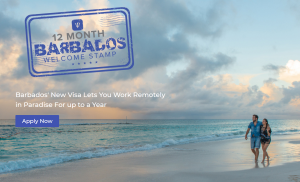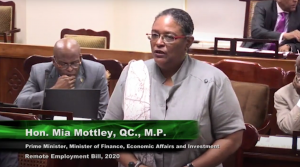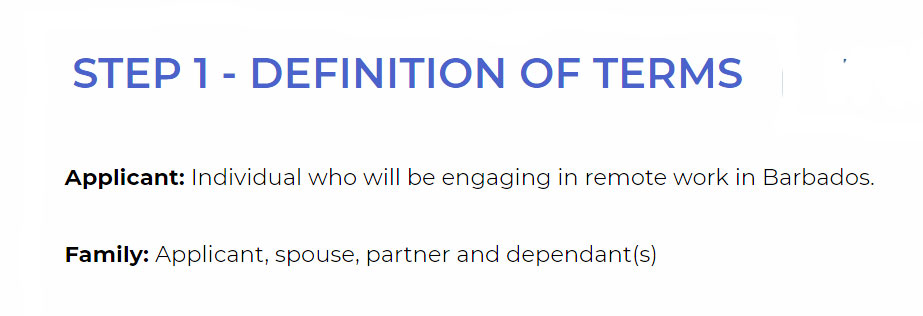A Barbados welcome for everyone but LGBTQ couples
Barbados launched a 12-month “Welcome Stamp” visa program that excluded same-sex couples. As that homophobic bias was exposed to public criticism, the application was amended to include LGBTQ+ couples, but Barbados’ harsh anti-gay laws remain on the books.

By Bridget Stauss
Earlier this month, Barbados Prime Minister Mia Mottley rolled out her nation’s new 12-month “Welcome Stamp” visa program, hoping to attract remote workers to the island during the Covid-19 crisis.

The program is intended to bring people with stable incomes to Barbados, a nation suffering from the Covid-19 pandemic’s effect on tourism. Prior to the Covid-19 outbreak, approximately 35% of Barbado’s GDP came from tourism and travel.
Applicants to the “Welcome Stamp” visa must earn a minimum of US$50,000 per year and be able to support themselves throughout the year. The application also requires an up-front fee of $2,000 for individuals and $3,000 for families.
Though the website features a warm, seemingly inclusive invitation from Prime Minister Mottley, the initial application for the “Welcome Stamp” visa explicitly excluded same-sex couples from the program. The application featured the following definition:

LGBTQ advocates in the region swiftly criticized the application’s LGBTQ-exclusionary language.
In response, Prime Minister Mottley sketched an idealized vision of Barbados as an island of inclusivity. She declared before Parliament on July 21, “As long as I am Prime Minister of this nation, we welcome all.” In the same speech, Mottley announced plans for new anti-discrimination legislation to prohibit homophobic bias in the workplace.
Barbados officials updated the wording on the “Welcome Stamp” application website following Mottley’s appearance in Parliament, but failed to remove the homophobic language entirely. While desktop versions of the site now list “spouse” under “Family” without a definition, as seen below, mobile versions of the site continue to show the original LGBTQ-exclusionary language.

Though Mottley disavowed the application’s initial homophobic wording and verbally extended the “Welcome Stamp” offer to same-sex couples, critics have pointed out an underlying hypocrisy in Mottley’s invitation: In Barbados, homosexual activity is illegal and is punishable by life in prison.
Mottley, whose Labour Party holds a “super majority” in Parliament, was celebrated as an LGBTQ ally and advocate prior to taking office. She was inaugurated in 2018 but has not yet moved to repeal Sections 9 and 12 of the 1992 Sexual Offenses Act, which criminalize same-sex relationships and LGBTQ sexual activity.
That law earned Barbados the eighth spot on Forbes’ “Most Dangerous Places for Gay Travelers” list in 2019. Past efforts to create protections for LGBTQ individuals in Barbados all failed to yield any tangible legislation.
Mottley’s call for new anti-discrimination legislation feels disingenuous to Carribbean LGBTQ advocates like Alexa Hoffmann, who believes that expanding the nation’s existing Employment Rights Act of 2012 (ERA) would be more effective. The ERA already includes employment protections for members of workers’ unions, individuals with dependent relatives, and individuals with HIV/AIDS. Hoffmann, a transgender woman, is suing her former employer under the ERA after being fired for legally changing her name to reflect her gender identity.
To Hoffmann, Mottley’s statement to Parliament is just “another case of the Barbados government tiptoeing and dancing around the issue” of institutionalized homophobia.
Though the “Welcome Stamp” visa application site has been (haphazardly) updated to remove the LGBTQ-exclusionary wording, such changes do little to keep LGBTQ individuals safe in Barbados. LGBTQ tourists will never truly be “welcome” in Barbados until Prime Minister Mottley’s government creates legislative protections for LGBTQ people and ends the criminalization of homosexuality.
Bridget Stauss, the author of this article, studies history and international relations at Amherst College in the United States.
Related resources:
- Rainbow Carribbean Facebook page
- Barbados case challenges anti-trans bias in workplace (February 2020, 76crimes.com)
- Rainbow Caribbean site focuses on LGBTQ rights (
- Barbados school won’t let trans girl wear girls’ uniform (
- Barbados: No jail time for violent attack on trans activist (April 2019, 76crimes.com)
- Barbados: A brush with death, a vigil for trans murder victims (November 2018, 76crimes.com)
- Rising transgender murder rate: 369 since last fall (November 2018, 76crimes.com)
- We need to do better: Barbados Pride for me as a trans woman (July 2018, 76crimes.com)
More context:




